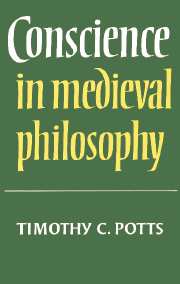4 - Aquinas
Published online by Cambridge University Press: 06 January 2010
Summary
Aquinas consolidated Philip's way of distinguishing between synderesis and conscientia with Bonaventure's notion of basic deontic propositions which are necessary, making the latter the proper objects of synderesis. He discussed conscience in three places: first, as one might expect, in his commentary on the Judgements of Peter Lombard, an early work of 1253–1255; second, in the sixteenth and seventeenth of his Debated Questions on Truth, which date from the academic session 1257–1258; and, finally, in the Summa theologiae 1.79, written about ten years later. The third discussion is indeed a summary of the second and, as he did not change his view in the meantime, I have taken the latter as the basis of my exposition. It also relates more closely to the texts which have already been considered here.
Aquinas, like Philip, begins with synderesis. His first question is the usual classificatory one: is it a potentiality or a disposition? Then, can it do wrong? and, to conclude, is it extinguished in some people? The argument by which Aquinas settles the first question is alien to a modern reader, because it involves a comparison of men with angels and presupposes a hierarchy of beings whose natures overlap:
a lower nature, at its highest, comes near to what is proper to a higher nature, participating in the latter imperfectly. Now the nature of the human mind is below that of an angel, if we consider what is the natural way for either to apprehend things. […]
- Type
- Chapter
- Information
- Conscience in Medieval Philosophy , pp. 45 - 60Publisher: Cambridge University PressPrint publication year: 1980



